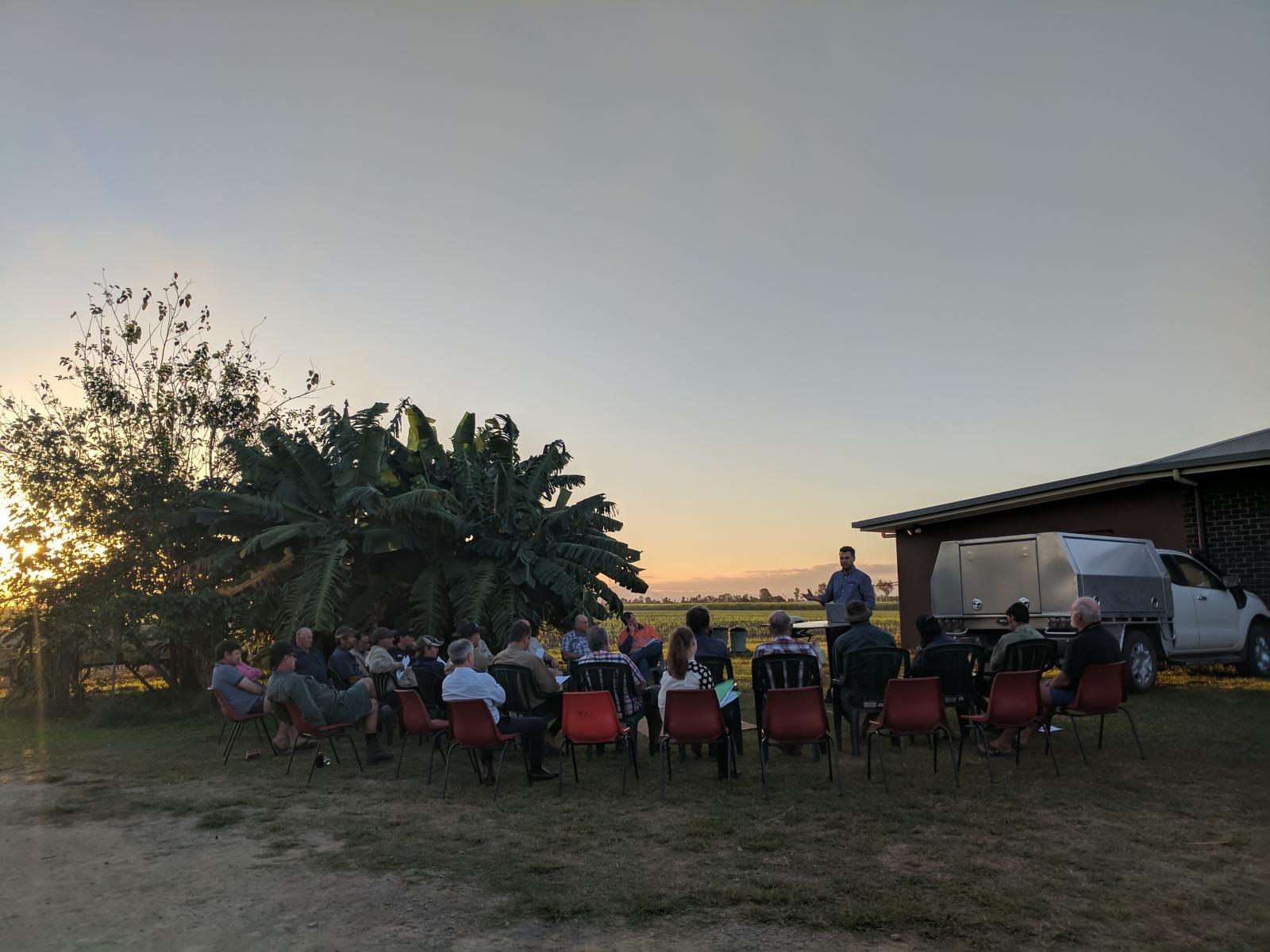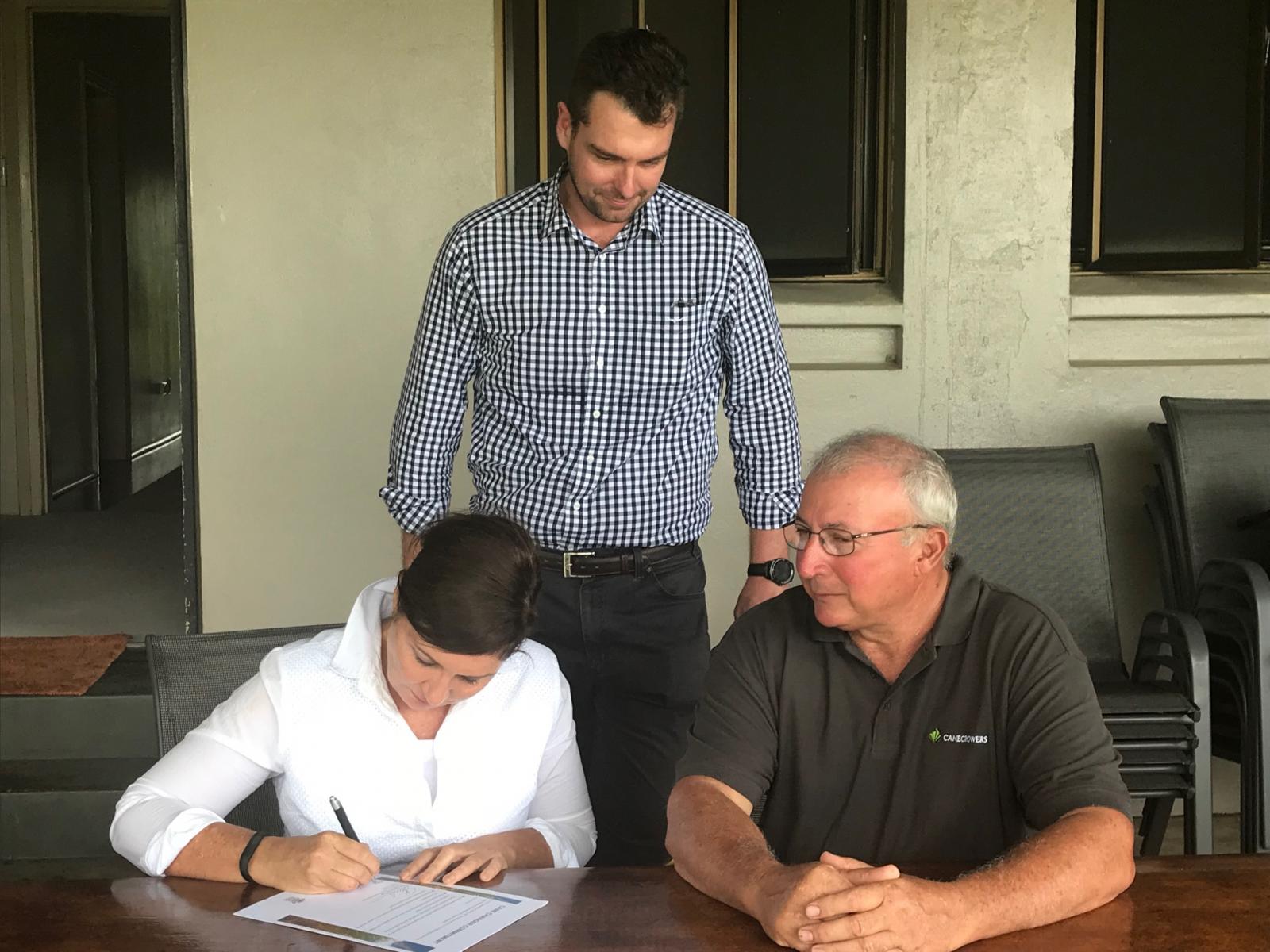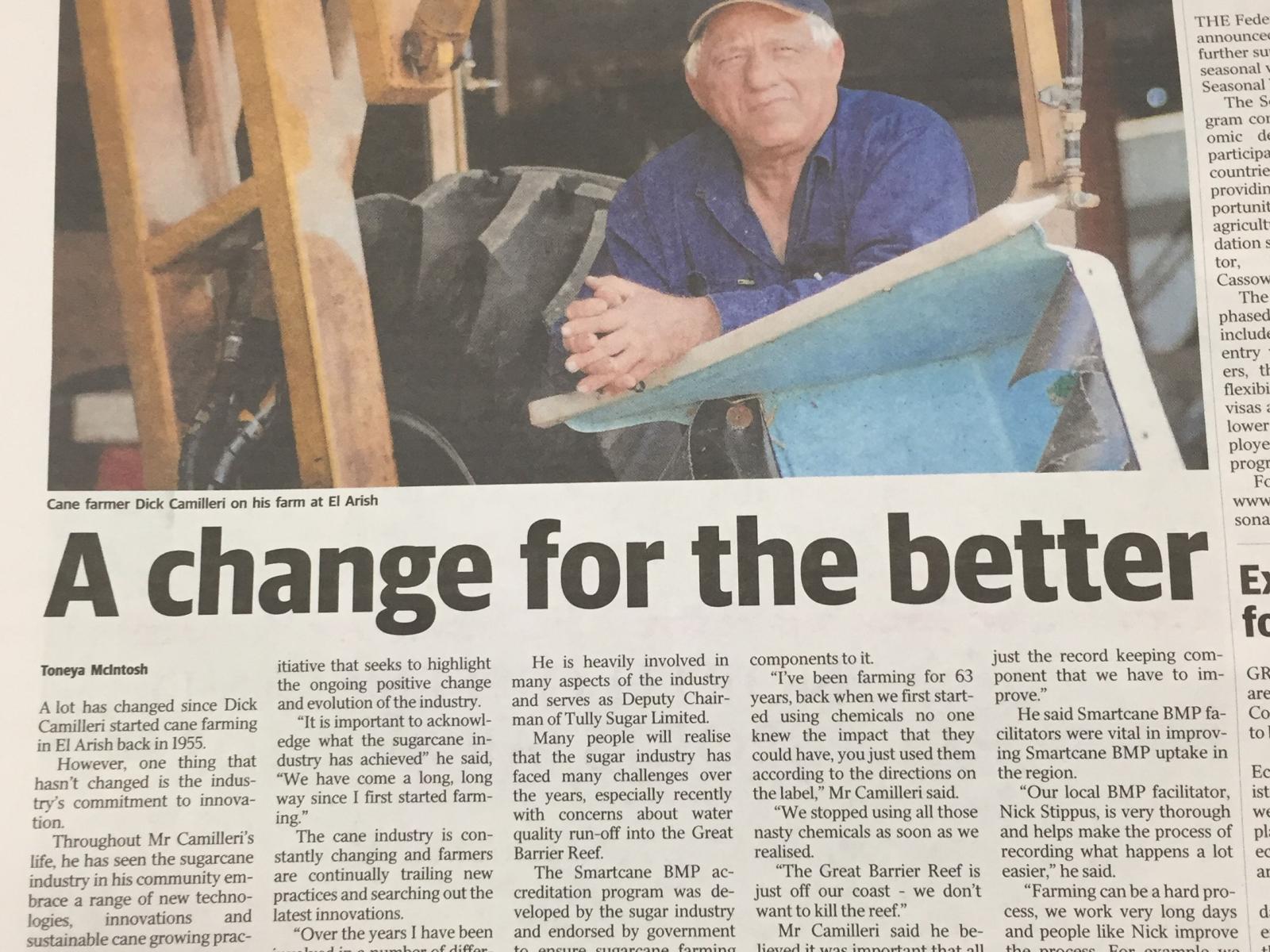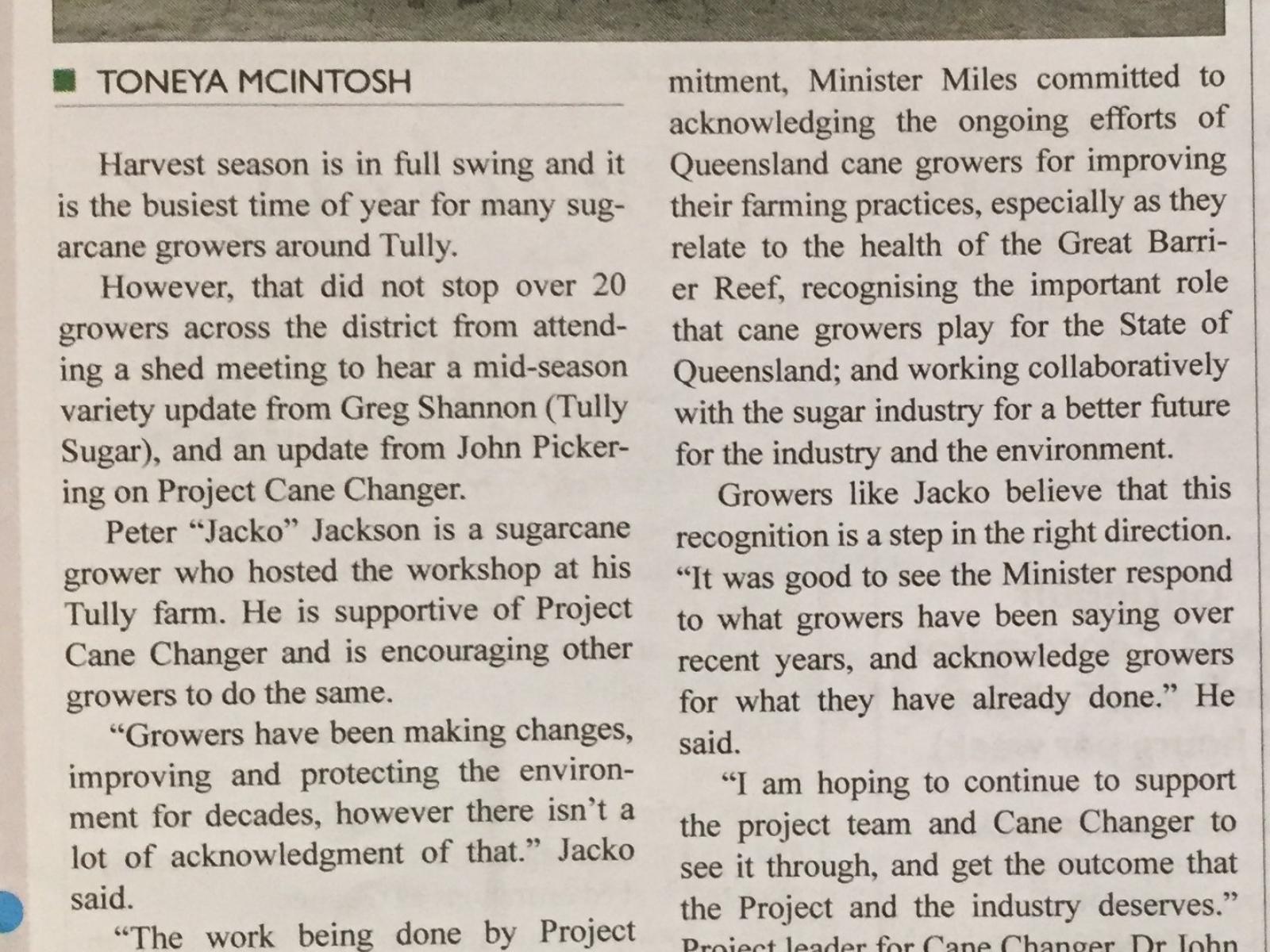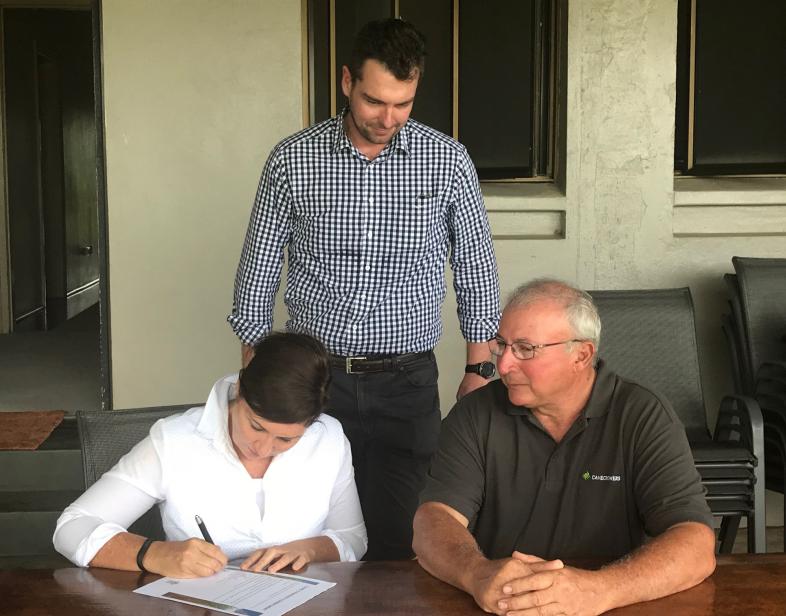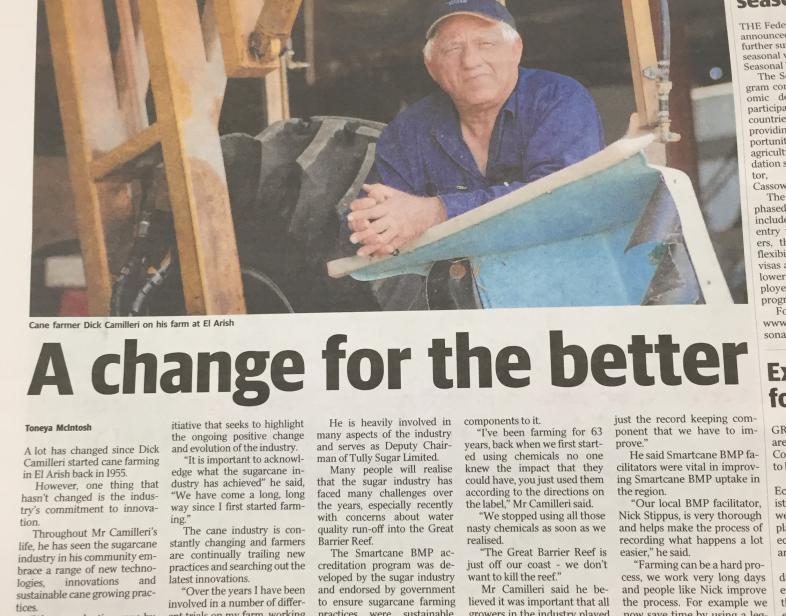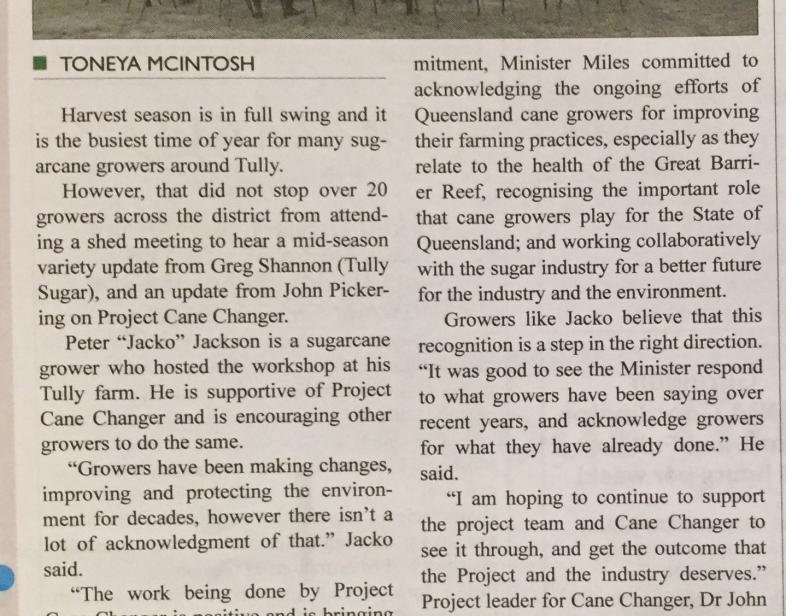An Overview Of Our Solution
The Great Barrier Reef is one of the natural wonders of the world. It's the world's largest reef system, worth ~$6 billion yearly to the economy & is, unfortunately, under extreme threat. Climate change combined with the water quality runoff from agricultural land practices has placed considerable strain on its health. The project in this application, dubbed ‘Cane Changer’, works with cane farmers to accelerate the uptake of positive farming practices that improve water quality running into the reef which builds its resilience to stressors such as climate change. Cane Changer uses tools & strategies based on behavioral science because at the heart of this issue is actually a problem of human behaviour, not an environmental problem. Cane Changer's approach provides a framework for ‘behaviour change’ that can be adapted to other contexts, eg, climate change.
- Population Impacted: 1200
- Continent: Oceania
Context Analysis
Water quality runoff into the Great Barrier Reef (GBR) from sugarcane farms has been identified as a contributing factor to its declining health. Substantial efforts have been made by the Australian Government over recent decades to encourage farmers to modify their practices, including legislating and offering economic incentives. Despite best efforts, the rate of change has been slow and inadequate to meaningfully protect the GBR. The Queensland Government funded Cane Changer in 2016, a project based on the idea that behavioral science is the key to helping protect the GBR. Cane Changer was tasked with analyzing the drivers of behaviors of over 4000 farmers across 1500 miles of coastline, and to design and deliver an evidence-based behavioral science program. Cane Changer encourages the uptake of farming practices that support sustainable businesses, environmental outcomes and improve water quality to make the GBR more resilient to climate change.
Describe the technical solution you wanted the target audience to adopt
While it is not the only outcome of the project, Cane Changer is strongly focused on encouraging sugarcane farmers to become accredited in the Smartcane Best Management Practice (BMP) Program. Smartcane BMP is an industry-developed, Government supported best practice system for sugarcane growing in Australia. To become accredited in the program growers must complete three modules associated with 1) Soil Health and Nutrient Management, 2) Irrigation and Drainage Management and 3) Natural Systems Management. Growers must uptake the range of environmentally sustainable farming practices outlined in the modules to become accredited. These practices are predictive of improved productivity, profitability and water quality which can make the reef more resilient to climate change.
Type of intervention
Describe your behavioral intervention
Unlike traditional ‘nudging’ approaches that target single-choice or single-event behaviour, our project targets the modification of up to 17 different behaviors & asks our target population to make changes in perpetuity. Accreditation in the BMP program requires modifications across the whole of farm operations including the uptake of 17 different farming practices. A behavioural analysis was conducted at the project’s commencement. Based largely on Lewin’s Force Field Theory of driving & restraining forces; it examined why growers were not engaging in the BMP program. The analysis revealed 2 major restraining forces 1) Farmers were reluctant to engage with BMP because signing up to the program was a threat to their social identity. They perceived that by prompting them to change their ways, governments & scientists had taken to ‘naming & shaming’ them, painting them as villains of the reef. 2) Due to social & environmental factors (e.g. aging population, low literacy levels & lack of training), farmers were failing to maintain written records, which are key to becoming accredited & improving water quality flowing to the reef. To combat restraining forces, we created 11 behavior change strategies – all of which were designed to improve accreditation rates in the BMP program. One of the main strategies was to create a strong positive social identity encapsulated in the project slogan ‘Setting the Record Straight’
As needed, please explain the type of intervention in more detail
Setting the Record Straight taps into growers’ desire to be seen in a positive light and be recognized for their efforts to protect the GBR. By setting the record straight, growers are agreeing to keep written records & become accredited in the BMP program. Accreditation provides evidence of growers’ positive attitude towards the GBR & that they are doing the right thing. The more farmers accredited, the more positive the industry’s identity becomes. A second strategy targeted a system-level restraining force identified in the analysis. A cycle of negativity had emerged between the government & growers, whereby farmers felt unfairly persecuted & reluctant to change. To stem the negativity directed towards the farmers, the State Environment Minister signed a behavior contract to recognize the cane farmers for their efforts to change & their environmental stewardship.
Describe your implementation
Cane Changer uses a broad range of activities to implement the 11 strategies, ranging from intensive one-on-one grower engagement to workshops for 50+ growers. We run behavioural skills training workshops to upskill the extension workforce and bring together industry groups to enhance collaboration. Each strategy is tailored to be district specific in consultation with local leadership groups. To ensure project adoption, we partner with other active projects and organizations to streamline engagement and maximize investment. By partnering with trusted organizations growers are more likely to get involved. Enabling conditions include creating a positive environment that fosters behavior change by unlocking positive social norms and improving the industry's social license. This is primarily driven through a behavior change communication strategy which utilizes a range of behavior change communication tools including; positive messaging to build industry pride, nudging and social norming through sharing stories of industry involvement in BMP. Over 20,000 people have seen our material online over the last 18 months and we regularly publish in the 8 print media outlets that we partner with. A significant success factor is the tagline ‘Setting the Record Straight,’ which acts as a positive social identity building strategy. The slogan has not only become the centerpiece of the Cane Changer project but is now widely used across the industry and frequently observed in materials and communications published by industry bodies and collaborators. Other success factors include valuing the industry for their previous work, linking with active projects, and thorough engagement with all stakeholders. Breaking the cycle of negativity was the largest obstacle encountered, particularly the ‘tit for tat’ between industry and government. This was overcome by asking the Environment State Ministers to sign behavior contracts committing them to positively recognising growers.
External connections
Cane Changer has a strong linkage to policy. The project was funded by the Queensland Department of Environment & Science following a recommendation from the GBR Water Quality Science Taskforce to develop a behaviour change program in partnership with the Queensland sugarcane industry. Two Ministers for Environment have signed behavioral contracts to recognize & value the sugarcane industry for its commitment to protecting the reef & the environment. Cane Changer is an official CANEGROWERS organisation initiative. In every district, the CANEGROWERS Board are members of the leadership team & help drive the project in their area. The systems-level approach of the project design ensures thorough engagement with all industry stakeholders, including growers and harvesters, millers, extension officers, government officials, & the public. Cane Changer aims to tie in wherever possible to existing infrastructure & personnel. Throughout the implementation of the project, we have partnered with a number of organizations to host events, run workshops, share learnings & engage growers. This includes the peak research body in the sugarcane industry, Sugar Research Australia, the milling groups, e.g, Tully Sugar Limited & MSF Sugar, & other research organisation such as CSIRO. To disseminate communication materials, we have strong partnerships with media such as the Cairns Post & Queensland Farmers Federation (QFF).
Who adopted the desired behaviors and to what degree?
Cane Changer is an ongoing project with interim findings emerging from mid-2018. Preliminary results indicate an approximate 300% increase in best management practice adoption throughout active project areas, translating to more than 44,000 hectares of sugarcane. Comparatively, larger sugarcane regions in Queensland have less than 9,000 accredited hectares in the best management practice program. As part of the project, two Queensland Ministers for the Environment have signed behavioural contracts to engage in more positive communication with the industry and recognises them for their efforts to protect the environment. This has resulted in more positive communications throughout Government and general public when mentioning the sugarcane industry. This in turn, boosts the industry’s self-efficacy and unlocks a positive social identity, which in turn feeds back to an increased uptake of innovative and sustainable farming practices.
How did you impact natural resource use and greenhouse gas emissions?
Cane Changer is not directly linked to greenhouse gas emissions (GHG). However, the project boosts uptake of Smartcane BMP which contains practices supporting water quality outcomes that improve the reef's resilience. Some of the practices have strong links to carbon and GHG. Including 1) using GPS guidance, reduced tillage and matched row spacing reduces fuel usage and improves soil carbon, 2) green cane trash blanketing reduces emissions from burning cane, 3) improvement in nitrogen use reduces GHG, 4) driving efficiency in irrigation, monitoring water levels and calculating water application rates lead to reduced running costs and electricity, therefore reducing GHG, 5) practices for natural systems management e.g. mapping of wetlands and waterways, restraining and connecting natural vegetation, and enhancing the habitat value of natural features provide opportunity for carbon offsets. CANEGROWERS are exploring on-going opportunities for carbon projects within Smartcane BMP.
What were some of the resulting co-benefits?
1) Enhanced the industry’s social license to operate. This in turn has led to increased self-efficacy in the sugarcane industry, which subsequently improves growers’ likelihood to get involved in more sustainable and innovative farming practices. 2) Increased collaboration and cooperation between industry bodies, and between the sugarcane industry and government. This has been achieved through behavioural skills training and a series of cooperation and cohesion workshops between relevant stakeholders. 3) Suggested improved water quality. As mentioned above, increased participation in the BMP program is linked to improved water quality in catchments that flow into the reef. 4) Economic benefits to growers. Recent studies have demonstrated a link between the farming practices associated with BMP accreditation and economic benefits for growers.
Sustainability
Project Cane Changer is funded by the Queensland Government's Department of Environment and Science and at present relies on Government grants to continue its operations. It also has significant in-kind support from sugarcane growers, industry extension, mills, CANEGROWERS and research.
Return on investment
Cane Changer was funded for a total of 2.2 million dollars (AUD) over 2.5 years. This investment has resulted in the most significant uptake of the BMP program in the Wet Tropics to date. While data collection is on-going and will not be fully collated until the project ends, interim monitoring shows improvements in social factors around industry pride, social cohesion, record-keeping education and behavior, and enhanced cooperation between industry groups. On average growers invest $1.62 for every project dollar invested by the government into programs designed to improve GBR water quality. Cane Changer strategies will create the conditions for continued and future grower engagement into programs that support environmental outcomes.
How could we successfully replicate this solution elsewhere?
As Cane Changer was designed at scale initially the model is ready for replication across a range of agricultural contexts that seek to understand barriers and support on-farm practice change. In the first instance, there is scope for it to be replicated to the rest of the Queensland sugarcane industry with little modification. More broadly, the behavioural systems analysis underpinning Cane Changer can be applied to a number of large-scale and intractable problems involving human behavior. The approach allows us to understand the context and system in which problem behaviors are occurring, and develop strategies to reduce their occurrence at both an individual and system level. An example of this approach is in our recent work with the Queensland Motor Accident Insurance Scheme; whereby this analysis was used to understand the psychological factors associated with rear-end collisions, and design and develop an intervention to reduce their occurrence across Queensland's South East.
